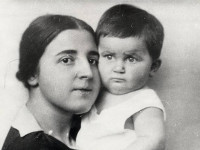Stalin's tragic love story killed by small German pistol
Telling stories about outstanding politicians of past and present (even if it is their love stories), one should identify one's position clearly. Clio, the muse of history, does not like accuracy, but she has her principles. Depending on the preferences of the writer, Stalin's second wife, Nadezhda Alliluyeva either committed suicide or was murdered.

The daughter of professional revolutionary Sergei Alliluyev, Nadezhda, was 20 years younger than Joseph Dzhugashvili (Stalin). She was not only Stalin's comrade in the party (she worked in Revolution and Culture magazine of the newspaper Pravda), but also the mistress of his house. Nadezhda gave birth to two children: Vasily in 1921, and Svetlana in 1926.
Her letters to her husband, whom she called "Dear Joseph," breathe love:
"Without you, it is very, very boring." As her nephew, Vladimir Alliluev wrote: "One day, after a party at the Industrial Academy, where Nadezhda studied, she came home very sick because she had sipped some wine, she felt bad. Stalin helped her get into bed and began to comfort me, and Nadezhda said: "You still love me a little bit." This phrase of hers seems to be the key to understanding the relationship between these two people. In our family, we knew that Nadezhda and Stalin loved each other."
On the day of the 15th anniversary of the Great October Revolution, Nadezhda had a painful headache. Despite the gloomy autumn morning, she was marching in a column of the Industrial Academy and, like everyone, welcomed the leaders of the party, who were standing on the podium of the newly built marble mausoleum. The next day, Stalin and his wife attended dinner at Voroshilov's, where a fight broke out between them. There are different versions to what exactly happened there, just like the allegations of what happened afterwards - a murder or a suicide. Most likely, we will never get the answer to this question.
On November 9, 1932, 31 -year-old Nadezhda Alliluyeva shot herself from a small pistol, "Walter," that her brother brought her as a gift from Berlin. Why did she have such a present? Participant of the Civil War, Paul Alliluev, was assigned to the Soviet trade mission in Germany as a military representative. On his return home in the spring of 1932, he served as a military commissioner of the Armor Management of the Soviet Red Army.
Svetlana Alliluyeva put the relationships of her parents into a purely political perspective. Her mother "realized in her heart that the father was not the man, as he seemed to her in her youth, and she was incredibly disappointed." Stalin's daughter came to her conclusions on the basis of the stories told by her nanny, an elderly lady. Svetlana Alliluyeva wrote that her mother was deeply depressed in the last days before her death. "The nanny heard her many times saying that she was fed up with everything."
The already mentioned nephew of Nadezhda, by contrast, tends to see the cause in a medical diagnosis. The matter was about the dysfunctional family history: there were people with weak psyche in their clan. "Apparently, difficult childhood led to the development of a severe disease - Nadezhda had the ossification of cranial sutures. The disease began to progress, she would often have depressions and headaches. All this had a significant impact on her mental state. She even traveled to Germany to consult leading German neurologists ... Nadezhda threatened to commit suicide on a number of occasions," Vasily Alliluyev wrote.
The memoirs of Alexander Barmin, a Soviet diplomat, contained the mentioning of the depressed of Stalin's wife shortly before her death. Barmin saw her with her brother Pavel Alliluyev on Red Square on November 7, 1932: "She was pale and looked tired, it seemed that she was not interested in anything that was happening around her. It was evident that her brother was deeply saddened and concerned."
The diaries of Molotov attributed the suicide of Nadezhda Alliluyeva to woman's whims, rather than depression and political differences with her husband. "She was very jealous of him. The Gypsy blood. She shot herself that very night. Pauline (Pearl, Molotov's wife, a close friend of Nadezhda Alliluyeva - Ed.) condemned her actions, saying, "Nadezhda was not right . She left him in such a difficult period of time! ' Stalin picked up the gun, from which she killed herself, and said, "This looks like a toy pistol, it shoots once a year. I was a bad husband, I had no time to take her to the movies." Then they started a rumor that it was him who killed her. I had never seen him cry. By the casket of his wife, I saw tears rolling down his cheeks. And then he said, very sadly: "I haven't protected her."
Stalin buried his wife on the Novodevichy Cemetery; he did not cremate her, as it common during those times. Svetlana Alliluyeva wrote that the father never visited the grave, but Stalin's security guard refuted this statement: "Stalin would go to her grave at night for a long time. He would thoughtfully smoke one pipe after another."
Recognizing medical, genetic and social factors that contributed to Nadezhda Alliluyeva's death, one can not completely deny politics. Rumor has it that she left a note, in which she accused Stalin of the collapse of the country. Nadezhda Alliluyeva was, above all, the party comrade, not the loving mother and caring wife.
Igor Bukker
Pravda.Ru
Subscribe to Pravda.Ru Telegram channel, Facebook, RSS!




